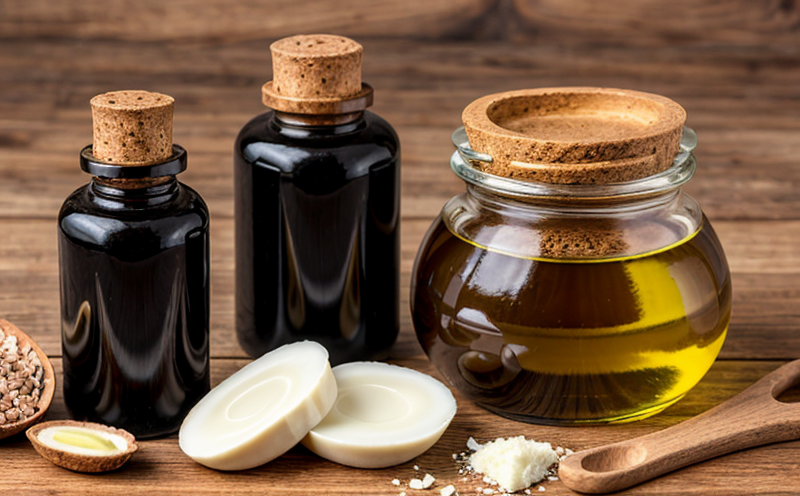Oils & Fats Testing
In the realm of Food & Feed Testing, oils and fats play a crucial role. These substances are not only essential nutrients but also key components in many food products. Proper testing ensures their quality, safety, and compliance with international standards.
The demand for accurate and reliable oil and fat testing is driven by various factors including regulatory requirements, consumer health concerns, and the need to maintain product integrity. This service encompasses a wide range of analytical techniques designed to evaluate physical properties, chemical composition, and potential contaminants within these essential products.
For instance, triglyceride content analysis helps determine the quality of oils used in food processing. The presence or absence of free fatty acids can indicate freshness and spoilage risk. Peroxide value testing is vital for assessing oxidative stability, which directly impacts shelf life and safety. Acid value tests are crucial indicators of rancidity levels.
Moreover, specific gravity measurements provide insights into the density differences between various types of fats and oils, aiding in product differentiation. Moisture content analysis ensures proper storage conditions prevent spoilage, while ash content determination identifies mineral impurities. Saponification value measures the amount of potassium hydroxide needed to saponify triglycerides, providing essential information about fatty acid composition.
Betadine content checks ensure that edible oils meet strict hygiene standards, especially relevant in the production of cooking fats and margarines. Iodine value tests measure unsaturation levels, which affect oil stability during processing and storage. Acid number assessments detect acidity caused by oxidation or contamination, impacting flavor profiles and shelf life.
The testing process typically involves meticulous sample preparation followed by precise instrumental analysis using advanced chromatographic techniques like gas chromatography (GC), high-performance liquid chromatography (HPLC), Fourier transform infrared spectroscopy (FTIR), atomic absorption spectrophotometry (AAS), and inductively coupled plasma optical emission spectrometry (ICP-OES).
These methods provide accurate, reproducible results necessary for ensuring product quality. Regulatory compliance is critical, with adherence to standards such as ISO 6585 for saponification value determination, ASTM D2440 for free fatty acid content measurement, and EN 14523 for peroxide value evaluation.
The importance of oils and fats testing extends beyond mere quality control. It contributes significantly to food safety by preventing the introduction of harmful substances into the food chain. By identifying potential contaminants early in the production process, manufacturers can take corrective actions promptly, safeguarding consumer health and maintaining brand reputation.
Benefits
Implementing oils and fats testing offers numerous benefits that are crucial for maintaining high standards in food & feed quality. Regular testing enhances product safety by detecting harmful contaminants before they reach consumers, thereby reducing the risk of health issues. It also improves efficiency through better resource management and cost savings.
- Enhanced Product Safety: By identifying potential hazards early on, manufacturers can address them promptly, ensuring safer products for consumption.
- Better Resource Management: Accurate testing data helps in optimizing production processes, reducing waste and minimizing raw material costs.
- Cost Savings: Early detection of issues allows for timely adjustments, avoiding costly recalls and damages.
Compliance with international standards is another significant advantage, ensuring that products meet the required benchmarks set by regulatory bodies worldwide. This not only opens up new markets but also enhances brand reputation among consumers.
Furthermore, oils & fats testing promotes transparency within supply chains, fostering trust between producers and suppliers while maintaining ethical business practices.
Industry Applications
The applications of oils & fats testing are diverse and span across multiple industries. The food sector relies heavily on this service to ensure the quality and safety of edible oils, shortenings, margarines, and other fat-based products.
- Edible Oils: Testing ensures that these substances comply with international standards and meet consumer expectations regarding purity and freshness.
- Shortenings & Margarines: Proper testing guarantees consistent product quality, extending shelf life through improved stability.
- Bakery Products: Consistent oil quality is essential for maintaining the texture, flavor, and appearance of baked goods.
- Cooking Fats: Accurate testing ensures that these products are suitable for various culinary uses, enhancing food safety and taste.
In addition to the food industry, oils & fats testing also finds applications in pharmaceuticals where certain fatty acids play key roles. The cosmetic sector benefits from precise measurements of oil content ensuring optimal product performance. For animal nutrition, testing helps formulate balanced diets that meet nutritional requirements for livestock growth and health.
Environmental and Sustainability Contributions
The practice of oils & fats testing plays a role in environmental sustainability by promoting responsible production practices. By ensuring the purity and quality of raw materials, this service helps reduce waste generation during processing stages.
- Reduction in Waste: Accurate testing prevents overprocessing or using substandard raw materials, minimizing waste streams.
- Sustainable Resource Use: Properly managed production processes contribute to efficient use of natural resources like vegetable oils and animal fats.
- Emission Reduction: Improved efficiency in manufacturing processes leads to lower energy consumption and greenhouse gas emissions.
Moreover, the identification of harmful contaminants early can prevent their release into the environment through improper disposal methods. This proactive approach supports broader sustainability goals by fostering eco-friendly practices throughout supply chains.





